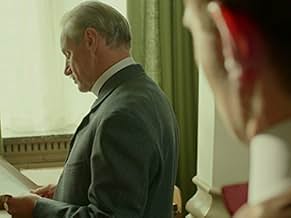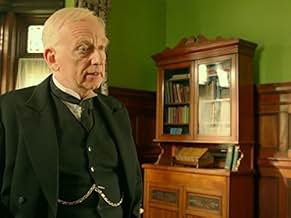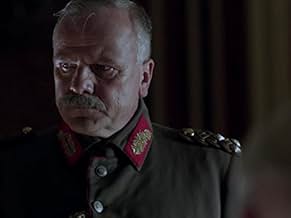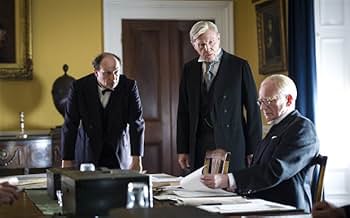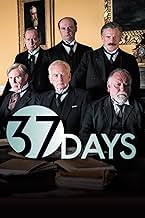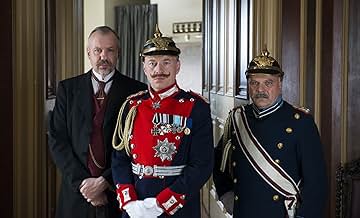37 Days
- Mini-série télévisée
- 2014
- 1h
NOTE IMDb
8,1/10
1,6 k
MA NOTE
Ajouter une intrigue dans votre langueA TV mini-series that unveils the behind-closed-doors story of the final weeks before the outbreak of World War I.A TV mini-series that unveils the behind-closed-doors story of the final weeks before the outbreak of World War I.A TV mini-series that unveils the behind-closed-doors story of the final weeks before the outbreak of World War I.
- Récompenses
- 1 nomination au total
Parcourir les épisodes
Avis à la une
You don't need to be interested in history to be absorbed by the most important 37-days in history. Days that led to the WW1, WW2, and everything thereafter. Fabulous production!
If you are a history buff, 10/10 and compulsory viewing.
If you are a history buff, 10/10 and compulsory viewing.
The writers of this lousy propaganda have never read any history book, so all series is full of dunno what. Wilhelm wears Iron Cross before the war - it is awarded only in wartime. Similarly, Nicholas wears St George. He was awarded 4th grade only 1915. He has stripes on trousers - in Russian army it is only for generals, and Nicholas was just a Colonel. German uniforms are not correct. Edward Grey acts and speaks as football hooligan. As the rest of British statesmen. Clerks in foreign offices are half-dressed - nobody would allow to show up wearing only a vest. Etc. Generally - watch with shock and awe. Then go to dark corner and weep about decline of education and civilization.
This series shows how WW1 started. Nobody actually wanted war, but everybody thought someone else will stop it. When it started, there was no way back.
The main reason behind this mini-series was to commemorate the 100th anniversary of the outbreak of WW1, so this programme certainly had an educational purpose behind it. Unfortunately, the only saving grace of this rather clumsy attempt to tell the story was the brilliant performance of Ian McDiarmid, who despite being far too old to play Sir Edward Grey, was astonishingly convincing in the role. As has been mentioned by other reviewers, the continental characters were very poorly played, with some over the top hysterics from Kaiser Wilhelm and Von Moltke in particular -shouting and gesticulations taking the place of cogent discussion. The actors playing the Kaiser and the Tsar, in particular, looked nothing like the genuine individuals, and tried to make up for it with poor acting. There was also very little from the Austro-Hungarians, other than their ambassador coming up with poor excuses whilst being reprimanded like a naughty schoolboy by Sir Edward. The other continental characters conformed very much to national stereotypes. Finally, three hours did seem rather too much to explain the events - a single, edited two hour programme would have been much better. The first two episodes contained some periods of rather unnecessary tedium, only redeemed by the third one.
Having read some of the other reviews on "37 Days" I am not sure whether it is a great series about historical facts or a great series about historical events as seen from the ultimate winners' point of view. Suffice to say, it is a great entertainment if you like that sort of genre.
Personally, I thoroughly enjoyed it (but then it is my sort of movie) as I enjoyed "Elizabeth, The Golden Age" and "The Other Boleyn Girl" although I honestly have very little idea as to the historical accuracy of any of them. Having so said, one has to presume that SOME historical accuracy had to be present otherwise the whole thing would have been nothing more than a fantasy movie about a fictional war (or, to be more correct, the events leading up to one) and that, it clearly wasn't.
I suppose the reason that I like this type of movie is because it has (at least, some) bearing on how the world got to be where it is today and, to that end, I'm sure that "37 Days" has sufficient accuracy to preclude it from being a parody. Other reviewers have commented, for example, on the inaccuracy of the portrayal of Czar Nicholas and, whilst I have no doubt that they write from a much better knowledge of the facts than I possess, it doesn't make the story as presented any less entertaining. Which raises the question, "Is this a film loosely based on historical events or is it a documentary?" and the answer to that makes all the difference in the world on how you view it.
I have rated the "37 Days" trilogy much the same as I rated Peter Jackson's "Lord of the Rings" trilogy which is on entertainment value and, in turn, makes me wonder how much relevance historical accuracy and artists' license have on rating entertainment value. To put that another way, when portraying events that actually happened, should historical accuracy be an essential facet? Because "37 Days" occurred much more recently in a time when journalistic reporting was far better developed and records much more prolific than a few hundred years earlier writers and directors have many, many more "facts" that they can draw upon than they had, for example, when making "Braveheart" or "Troy" so that history buffs (who also have those records) are able to vilify them for every little inaccuracy. That is sad because, in the end, unless they ARE documentaries, movies are made for entertainment and caricaturisation of characters simply adds to that entertainment. If they are caricatured to the point of absurdity, then the movie is a comedy or even a farce (a genre that I sadly note IMDb still doesn't have) and the entertainment value takes on a somewhat different complexion - but it's still entertainment!
Perhaps, by way of illustrating the point, another much-loved BBC TV series, "Heartbeat" - which is all fiction based around a historically factual police force set in Yorkshire in the early 1960s - often shows scenes that include railway trains. Those scenes are filmed at the North Yorkshire Moors Railway which is an enthusiast-run heritage steam railway where locomotives that never ran anywhere near Yorkshire are preserved in working order. So, because I happen to be a railway enthusiast, I COULD bemoan the absolutely prototypical inaccuracy of a Southern Railway S15 class steam engine pulling into Aidensfield station but what would be the point? Rather, I joyfully thank the enthusiasts who made the shooting of such scenes possible at all!
So, whilst I thank all those other reviewers who have educated me, fortunately, that education hasn't spoiled my enjoyment of "37 Days" one bit! I hope it will be available on DVD soon> I'll buy it.
On the story line, the only puzzling aspect for me was why on earth Britain felt any compunction to support France - a nation that had been a traditional enemy of theirs for centuries. I seemed to me that, had Britain simply acted as an observer, Germany wouldn't have had any reason to attack them as the disagreements were all continental. Also, it was really great that the story ended before America got involved and we were subjected to all the "swagger" that would have been associated with that!
Personally, I thoroughly enjoyed it (but then it is my sort of movie) as I enjoyed "Elizabeth, The Golden Age" and "The Other Boleyn Girl" although I honestly have very little idea as to the historical accuracy of any of them. Having so said, one has to presume that SOME historical accuracy had to be present otherwise the whole thing would have been nothing more than a fantasy movie about a fictional war (or, to be more correct, the events leading up to one) and that, it clearly wasn't.
I suppose the reason that I like this type of movie is because it has (at least, some) bearing on how the world got to be where it is today and, to that end, I'm sure that "37 Days" has sufficient accuracy to preclude it from being a parody. Other reviewers have commented, for example, on the inaccuracy of the portrayal of Czar Nicholas and, whilst I have no doubt that they write from a much better knowledge of the facts than I possess, it doesn't make the story as presented any less entertaining. Which raises the question, "Is this a film loosely based on historical events or is it a documentary?" and the answer to that makes all the difference in the world on how you view it.
I have rated the "37 Days" trilogy much the same as I rated Peter Jackson's "Lord of the Rings" trilogy which is on entertainment value and, in turn, makes me wonder how much relevance historical accuracy and artists' license have on rating entertainment value. To put that another way, when portraying events that actually happened, should historical accuracy be an essential facet? Because "37 Days" occurred much more recently in a time when journalistic reporting was far better developed and records much more prolific than a few hundred years earlier writers and directors have many, many more "facts" that they can draw upon than they had, for example, when making "Braveheart" or "Troy" so that history buffs (who also have those records) are able to vilify them for every little inaccuracy. That is sad because, in the end, unless they ARE documentaries, movies are made for entertainment and caricaturisation of characters simply adds to that entertainment. If they are caricatured to the point of absurdity, then the movie is a comedy or even a farce (a genre that I sadly note IMDb still doesn't have) and the entertainment value takes on a somewhat different complexion - but it's still entertainment!
Perhaps, by way of illustrating the point, another much-loved BBC TV series, "Heartbeat" - which is all fiction based around a historically factual police force set in Yorkshire in the early 1960s - often shows scenes that include railway trains. Those scenes are filmed at the North Yorkshire Moors Railway which is an enthusiast-run heritage steam railway where locomotives that never ran anywhere near Yorkshire are preserved in working order. So, because I happen to be a railway enthusiast, I COULD bemoan the absolutely prototypical inaccuracy of a Southern Railway S15 class steam engine pulling into Aidensfield station but what would be the point? Rather, I joyfully thank the enthusiasts who made the shooting of such scenes possible at all!
So, whilst I thank all those other reviewers who have educated me, fortunately, that education hasn't spoiled my enjoyment of "37 Days" one bit! I hope it will be available on DVD soon> I'll buy it.
On the story line, the only puzzling aspect for me was why on earth Britain felt any compunction to support France - a nation that had been a traditional enemy of theirs for centuries. I seemed to me that, had Britain simply acted as an observer, Germany wouldn't have had any reason to attack them as the disagreements were all continental. Also, it was really great that the story ended before America got involved and we were subjected to all the "swagger" that would have been associated with that!
Le saviez-vous
- AnecdotesThe music received an RTS nomination for Andrew Simon McAllister.
- GaffesSir Edward Grey was only 52 years old at the time of the events depicted in the series, yet is played by a 70 year old Ian McDiarmid.
- ConnexionsFeatured in The Wright Stuff: Épisode #19.45 (2014)
Meilleurs choix
Connectez-vous pour évaluer et suivre la liste de favoris afin de recevoir des recommandations personnalisées
- How many seasons does 37 Days have?Alimenté par Alexa
Détails
- Durée
- 1h(60 min)
- Couleur
- Rapport de forme
- 1.78 : 1
Contribuer à cette page
Suggérer une modification ou ajouter du contenu manquant

